November 23, 2025 – Day 3 of Kimchi Making, Paying Respects to the Late Great Master Doyeong at Geumsansa Temple, Community Dialogue Time
Hello. Today, on the fourth day since the passing of Geumsansa Temple’s Spiritual Leader, Great Master Doyeong, Sunim paid his respects and had a dialogue session with the community members who had finished making kimchi.
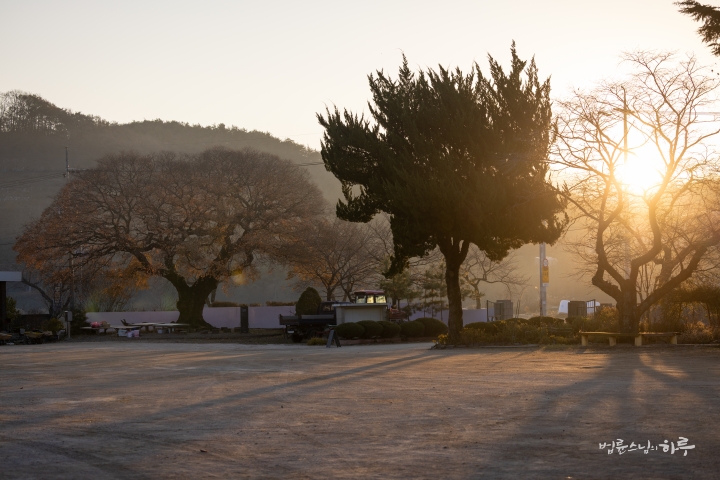
After completing morning practice and meditation, Sunim departed from Dubuk Jungto Retreat Center at 7 AM and headed to Geumsansa Temple. After a three-hour drive, he arrived at Geumsansa Temple, located in Geumsan-myeon, Gimje City, North Jeolla Province, at 10 AM.

Great Master Doyeong was the senior Dharma brother of Venerable Dobup, who has a close relationship with Sunim. Thinking of the deep connection between Venerable Dobup and Great Master Doyeong, who had walked the path of practice together after ordaining under Great Master Wolju, Sunim rushed from afar despite his busy schedule.
Upon arriving at Geumsansa Temple, Sunim met and exchanged greetings with Venerable Dobup, then headed together to the Cheoyeong Cultural Memorial Hall where the memorial altar was set up.
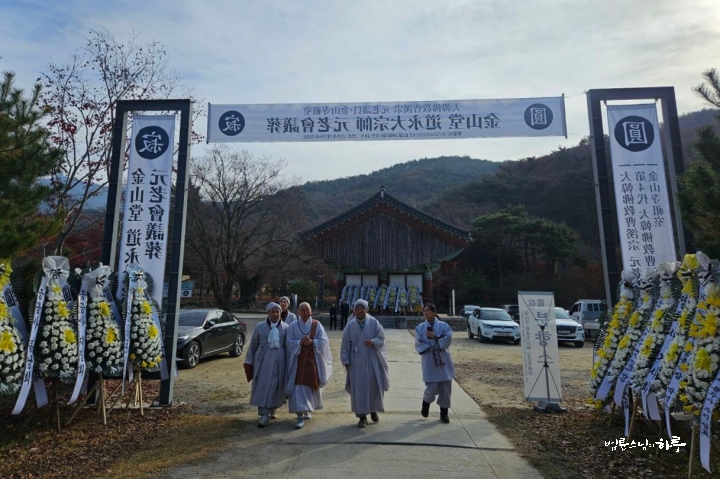
Sunim paid his respects at the memorial altar, honoring the practice spirit of Great Master Doyeong, who had walked the path of spreading the Dharma throughout his life as a teacher of the era.
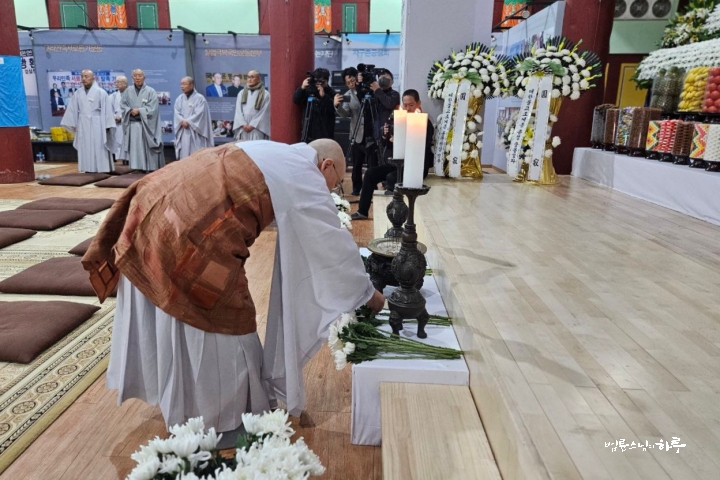
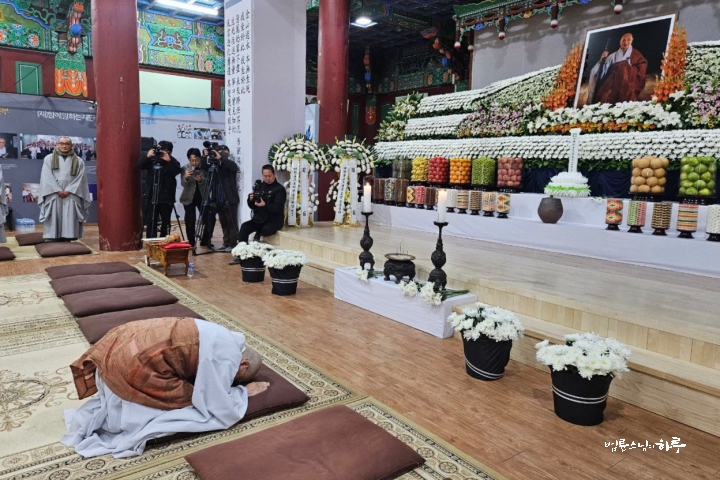
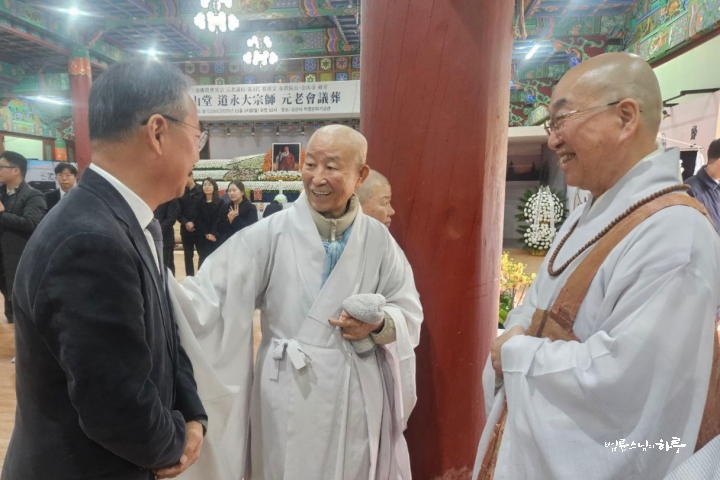
After exchanging greetings with the senior monks in attendance, Sunim shared tea and conversation for a while. Great Master Doyeong had served as the abbot of Geumsansa Temple, Heungboksa Temple in Gimje, and Songgwangsa Temple in Wanju. He also served as a member of the Central Council, Director of the Education Department of the General Affairs Office, and the 4th Head of the Jogye Order’s Propagation Center, making significant contributions to organizing the order’s administration and propagation system. His military chaplaincy work, which continued for over 50 years, is considered one of Great Master Doyeong’s most notable achievements. The senior monks shared many stories about the path Great Master Doyeong had walked.
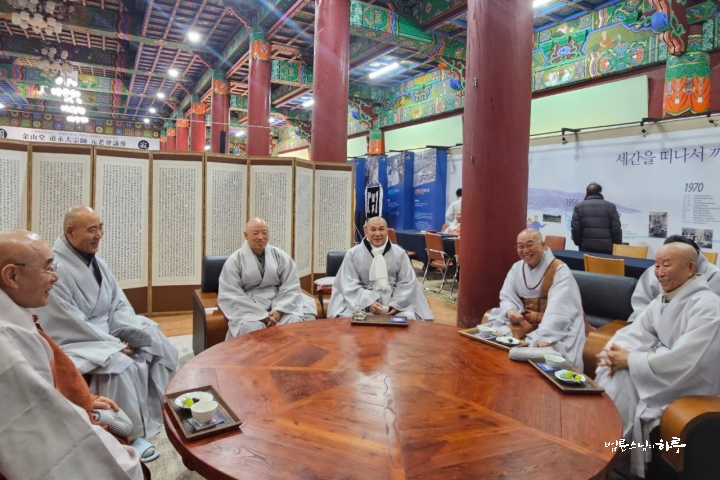
Sunim then paid respects at Geumsansa Temple’s Mireukjeon Hall, a National Treasure, and visited various halls throughout the temple grounds, including the five-story stone pagoda and Daejangjon Hall, before leaving Geumsansa Temple.
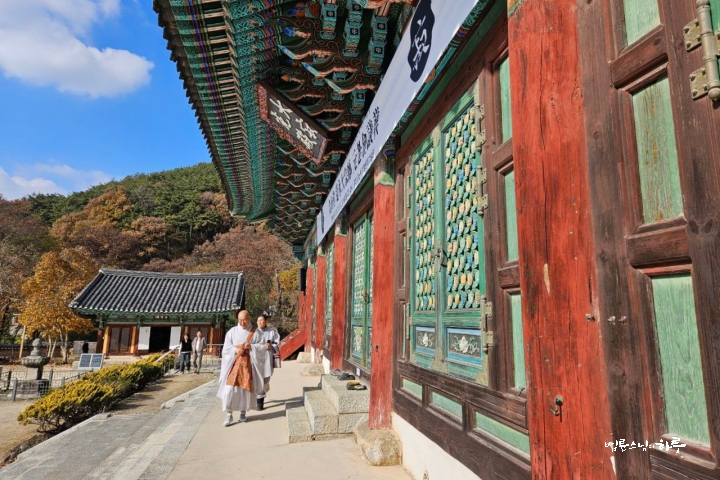
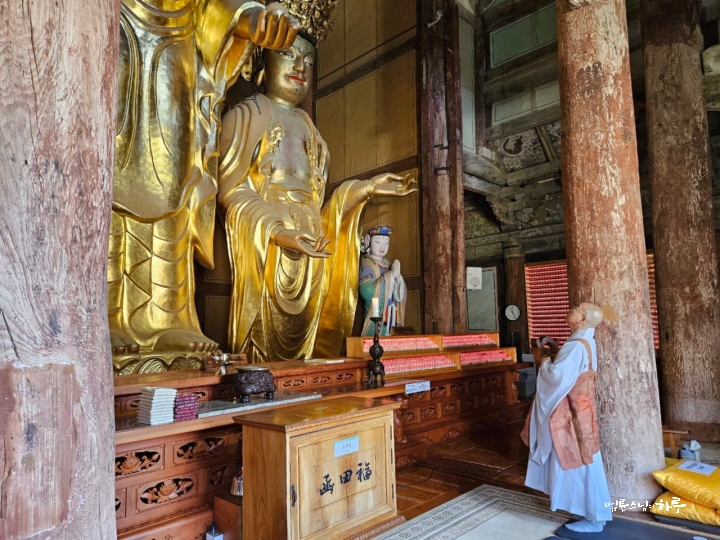
He got back in the car and drove on the highway for three hours from Geumsansa Temple. During the journey, he had lunch at a rest stop with garak noodles and arrived at Dubuk Jungto Retreat Center at 3:20 PM.
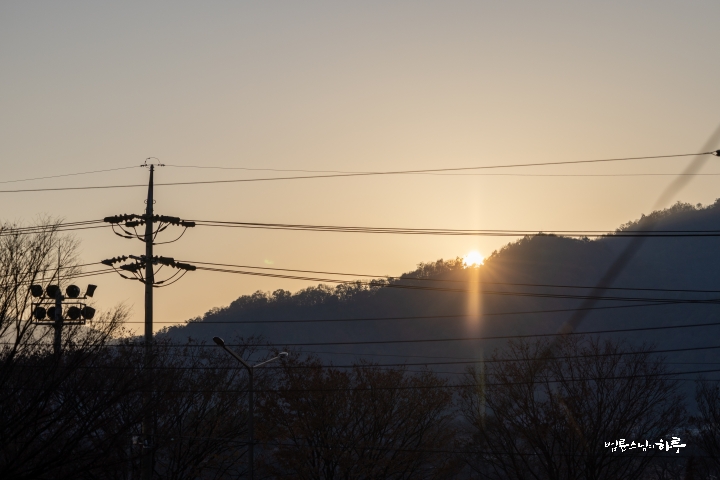
Meanwhile, at Dubuk Jungto Retreat Center, the community members spent the entire morning cleaning up after finishing the kimchi making. One team mixed the last remaining cabbages with kimchi seasoning and put them in containers.
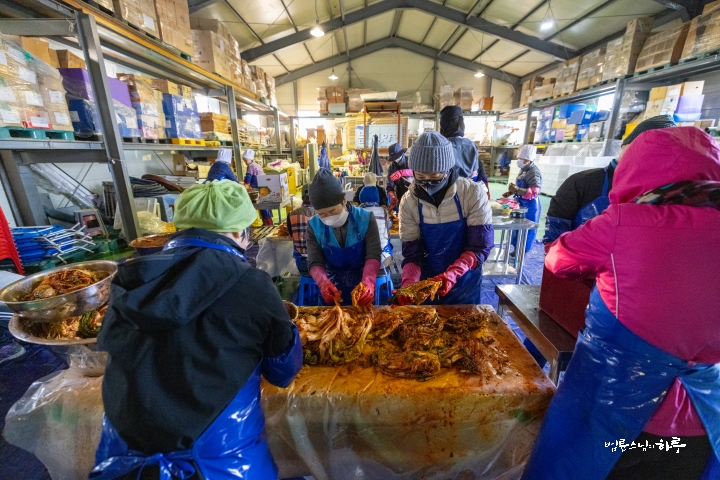
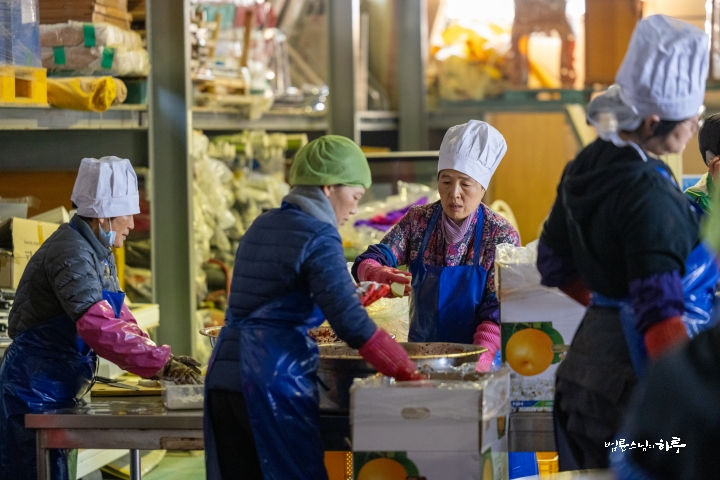
Another team thoroughly washed all the shelves, cutting boards, knives, baskets, trays, bowls, and rubber containers with water. The facilities team moved all the items from the warehouse back to their original places.
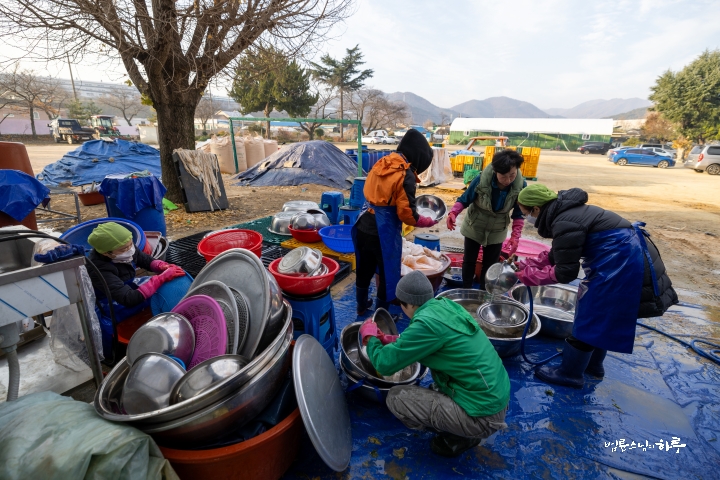
They dismantled the installed pallets and pools, and cleaned the inside of the warehouse with mops. The rubber gloves, aprons, and boots stained with kimchi seasoning were also washed clean and hung on clotheslines. After finishing the cleanup, they also picked the peppers that the farming team couldn’t harvest because they were busy preparing for kimchi making.
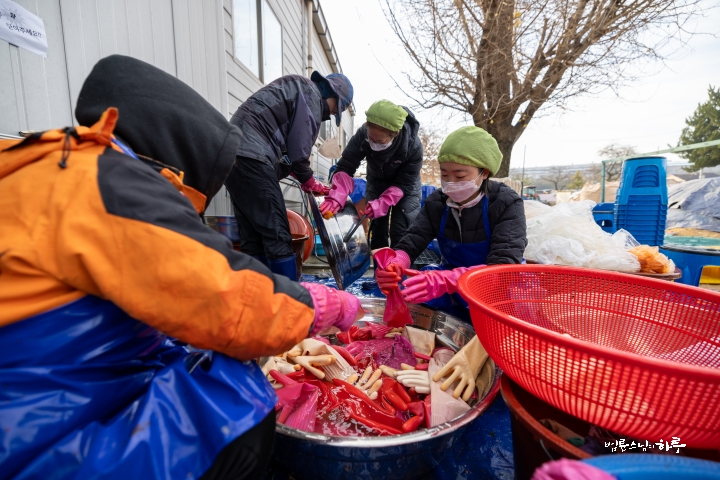
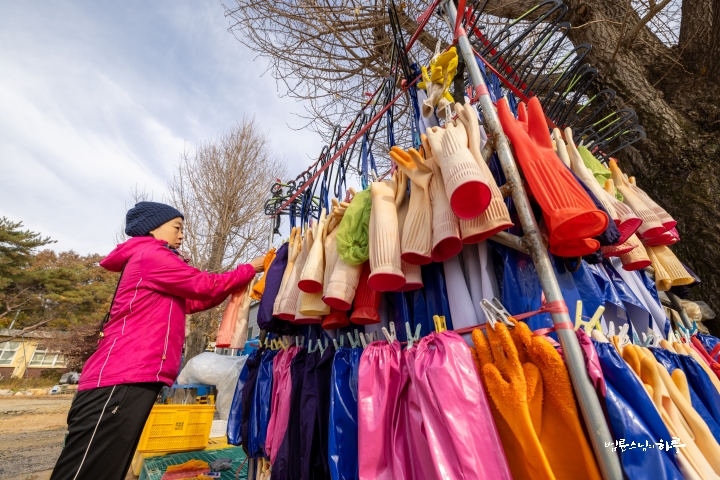
Over the past three days and two nights, everyone worked together to successfully complete making kimchi with 1,000 cabbages.
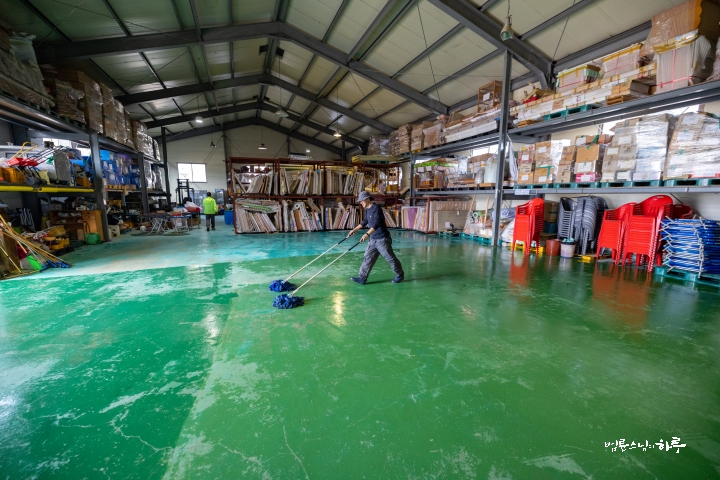
After washing their kimchi-scented clothes and taking baths, the community members all gathered at a restaurant in downtown Gyeongju at 5 PM. After having dinner together, they reflected on the process and shared their thoughts.
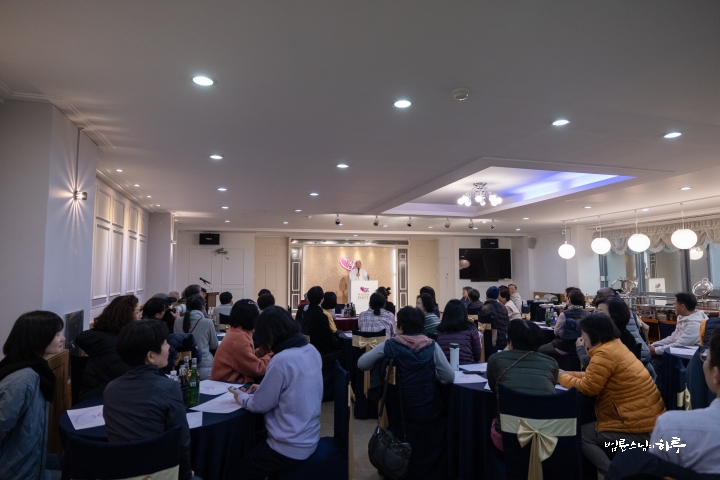
First, Sunim offered words of encouragement to the community members who had worked so hard.
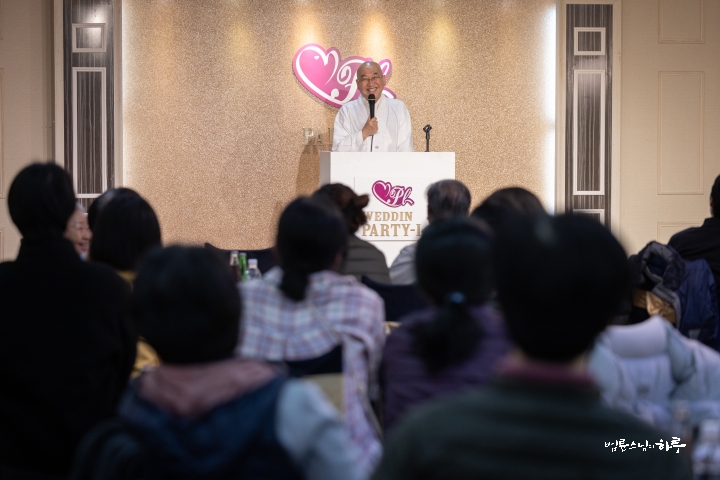
“After a long time, the community members did kimchi-making volunteer work for three days and two nights. Although it was tiring, it was all good, wasn’t it?”
“Yes!”
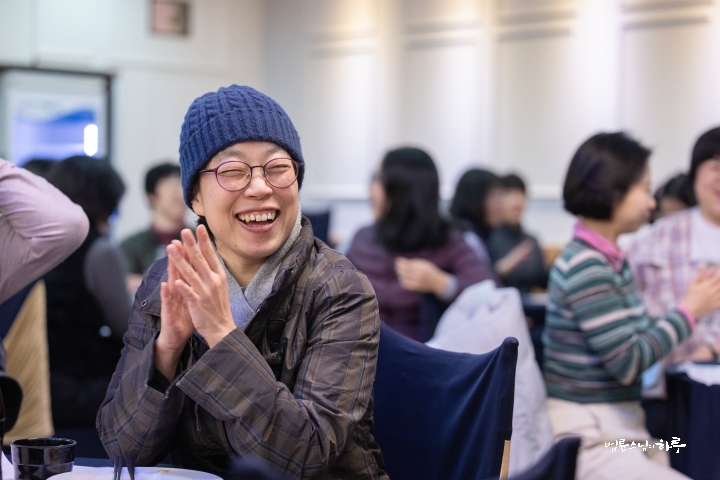
Next, Kim Eun-jin, the head of the farming team, came forward and shared her thoughts.
“I was worried whether we could really make kimchi with 1,000 cabbages in just two days, but we finally did it. You all worked really hard. Actually, many volunteers worked very hard in the process of preparing for kimchi making. I hope you’ll recognize that as well.”
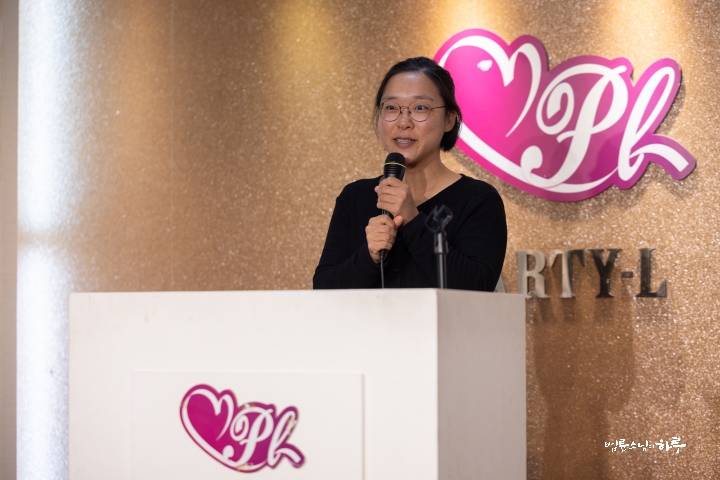
Next, Jung Yoon-mi, who oversaw the kimchi making, shared her thoughts.
“I feel sorry for scheduling things too tightly and making it hard for everyone. Thanks to that, we finished the kimchi making quickly, but I felt drowsy every time I announced the schedule. I sincerely thank all of you for following the schedule so well.”
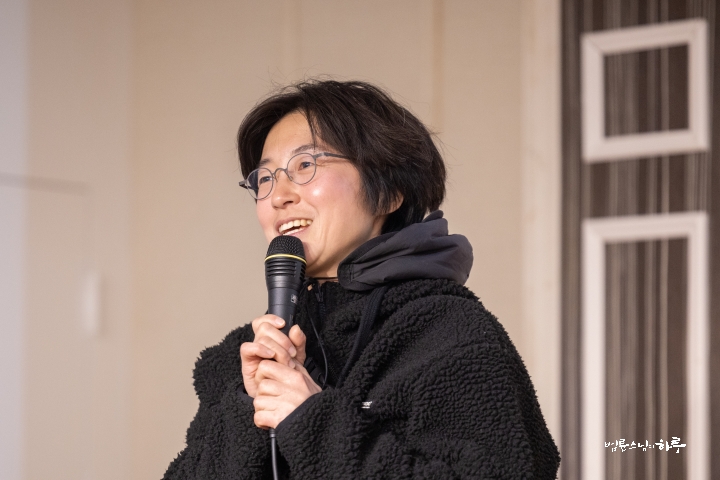
Dharma Teacher Myodang, who serves as the director of Dubuk Jungto Retreat Center, also shared her thoughts.
“This year, due to the autumn rainy season, most of our farming didn’t go well. However, the cabbage turned out better than last year thanks to the farming team’s great efforts. The rice harvest maintained last year’s yield. The summer was particularly hot, which was difficult for me too. Despite having only a few full-time volunteers, we were able to finish well thanks to the help of many volunteers. We’ll evaluate this well and prepare better for next year.”
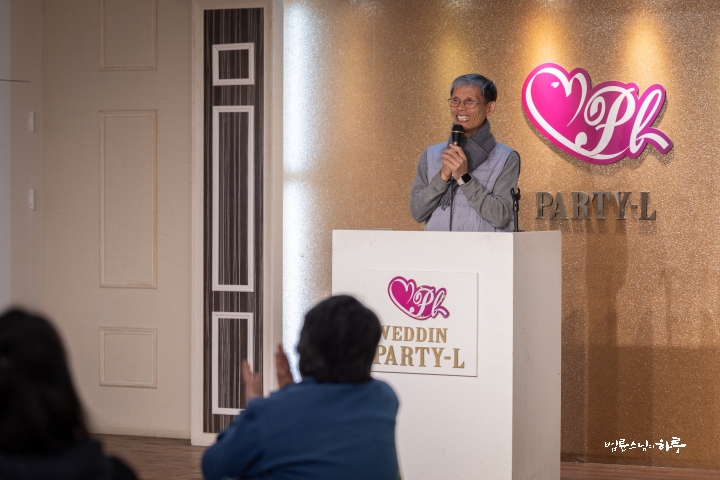
Sunim asked all the farming team members to stand up and requested that everyone give them a big round of applause.
“This year, the farming team worked really hard under difficult conditions. Please give them a big round of applause.”
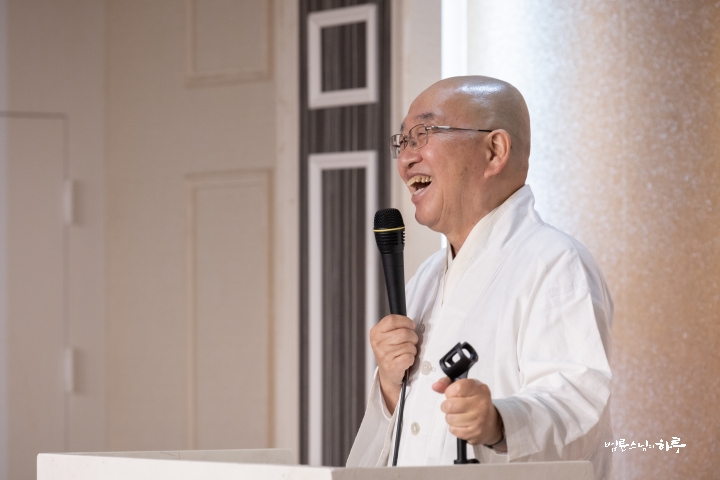
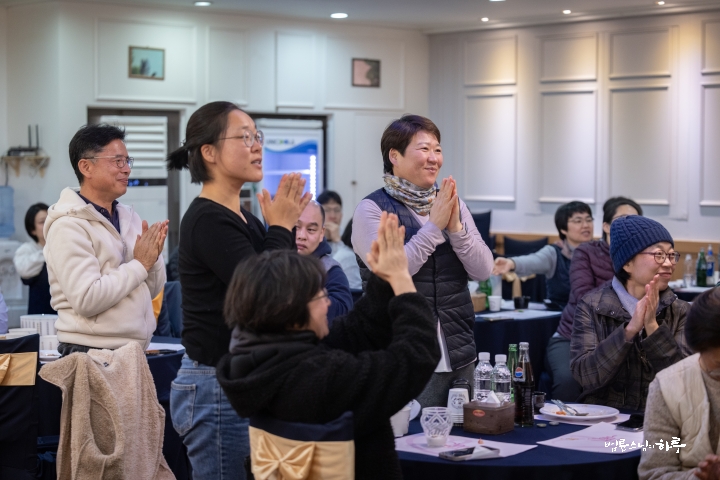
After encouraging the farming team, each department came forward in turn to encourage each other. First, the Youth Buddha team, participating in kimchi-making volunteer work for the first time, shared their thoughts.
“While we were happy to participate in the kimchi-making volunteer work, it was also difficult. There were moments when I wanted to go home, but I learned a lot from seeing the staff members and Dharma teachers working with smiles even during difficult times.”
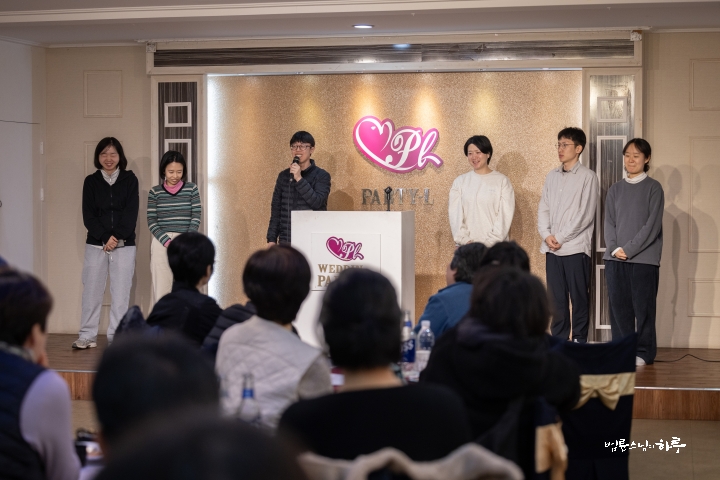
After the Youth Buddha team performed an exciting dance and went back to their seats, Dharma Teacher Hwagwang, who has been protecting Dubuk Jungto Retreat Center for 23 years, came forward and shared her thoughts.
“Farming has become very difficult due to the climate crisis. It’s work that absolutely cannot be done with such a small number of people, but the reason farming continues is thanks to numerous volunteers. This time too, about 300 volunteers came before the kimchi making to help with preparations. They don’t even get a meal, but they bring their own lunch boxes, work, and leave. I can’t express how grateful I am. While you all worked hard too, I hope you’ll recognize that numerous volunteers did the preliminary work.”
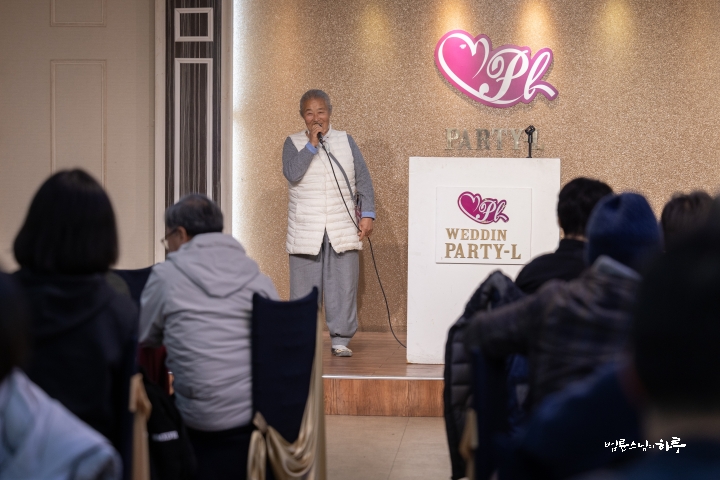
Dharma Teacher Hwagwang sang the song ‘Meongteong-guri’ with great enthusiasm.
Following this, the Construction team, Video Media team, A Day in the Life of Sunim team, Peace Foundation, JTS, Publishing team, Historical Archives team, International Cooperation team, Property Management Department, Secretariat, Training Center, and Dharma Teacher Group all stood up in turn to introduce themselves and gave each other encouraging applause.
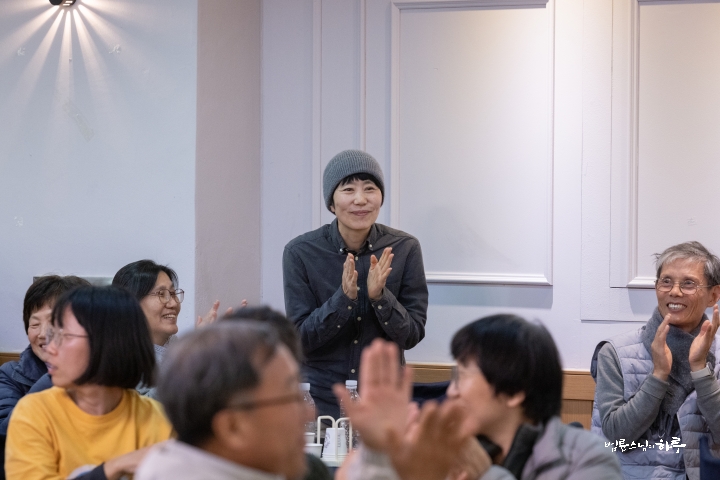

Finally, Sunim gave closing remarks.
“You’ve all worked hard throughout the year. With this, we’ll conclude the kimchi-making volunteer work.”
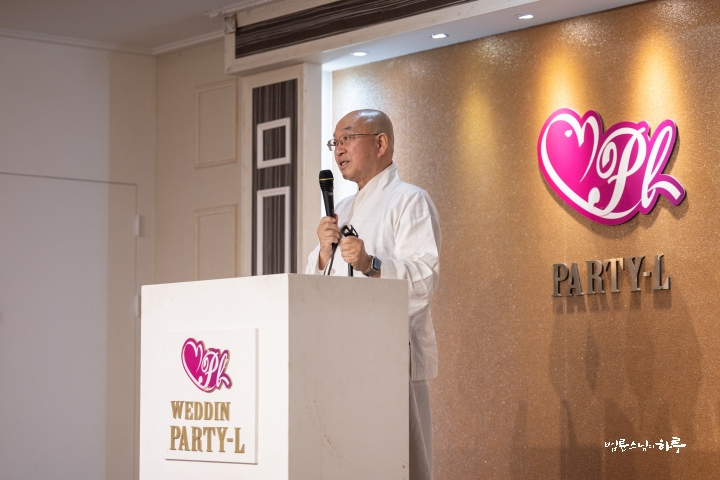
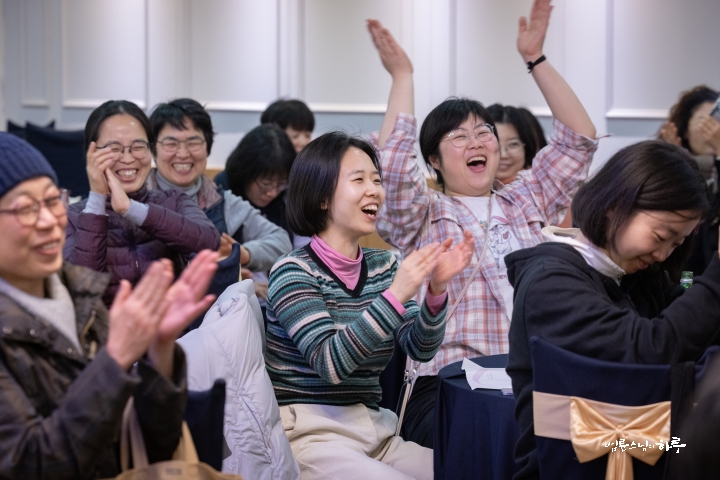
As evening prayer time approached, they hurriedly cleaned up and headed to Dubuk Jungto Retreat Center.
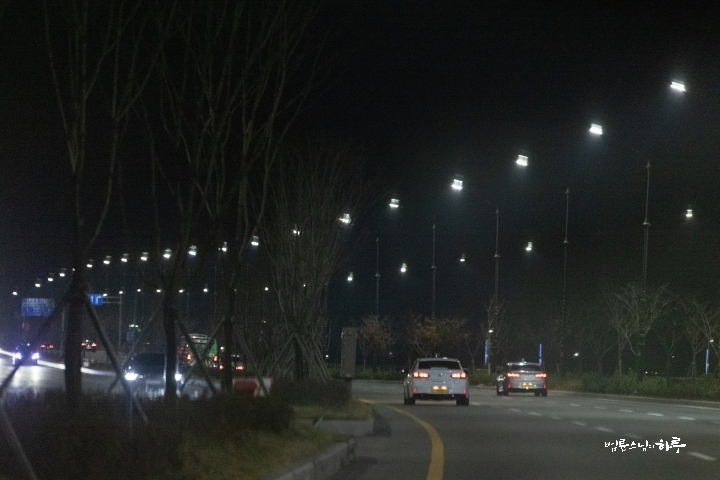
After arriving at Dubuk Jungto Retreat Center at 7:10 PM, they immediately held evening prayers. Following this, they had a dialogue session with Sunim.
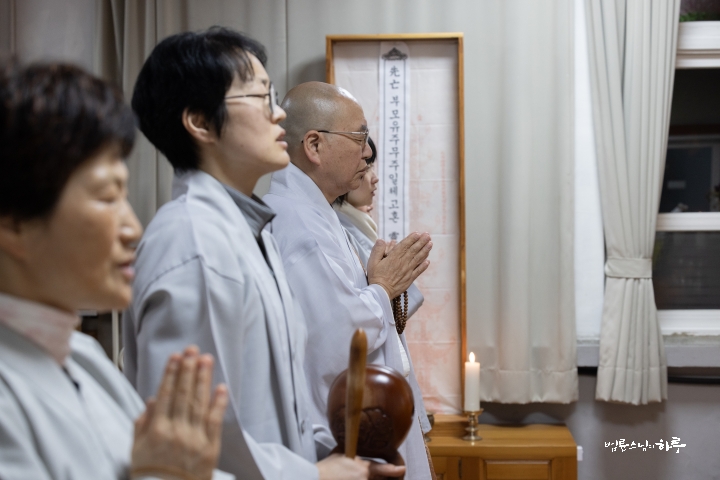
When the assembly requested a Dharma talk with three bows, Sunim began the dialogue.
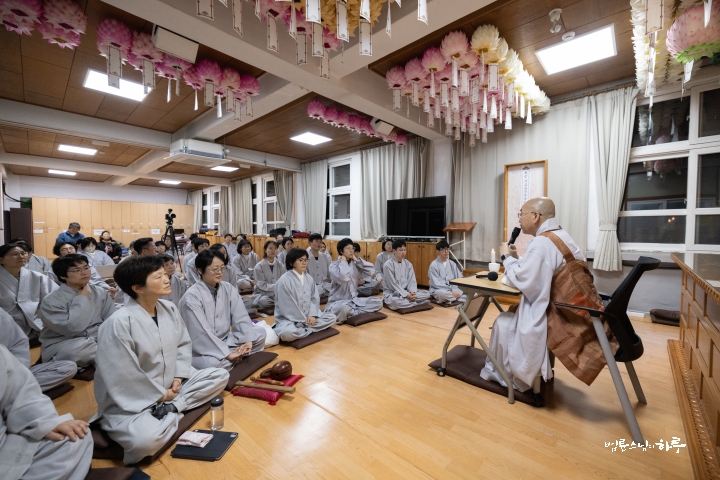
“This time is for dialogue about difficulties or questions that have arisen during your activities. Anyone who has something they’d like to discuss, please raise your hand and speak.”
During the two-hour session, five people raised their hands and asked Sunim questions. One of them was a JTS publicity officer who asked Sunim for advice on how to set the direction for publicity, saying she wasn’t sure how to proceed.
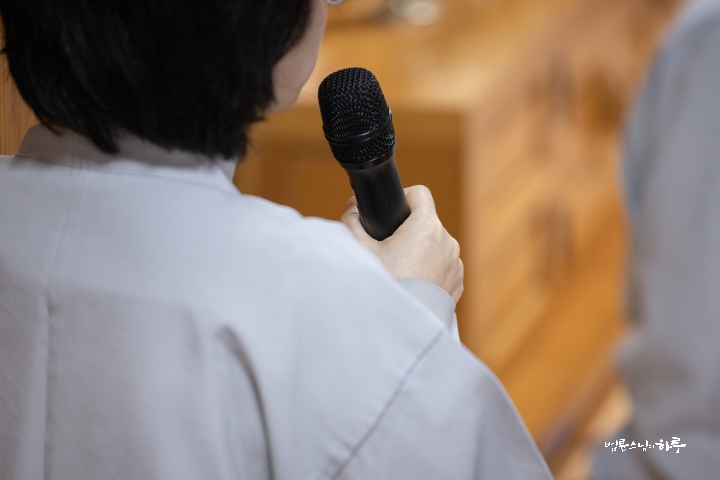
Why Doesn’t JTS Advertise?
For instance, when the major earthquake hit Turkey and Syria, while other NGO organizations went to Turkey where they thought more donations would come in, the fact that JTS went to Syria where no one was providing support was very moving to me. I thought that if we advertised focusing on this aspect of JTS, young people would like it. However, the fact that JTS is an organization that avoids consumerism seems to conflict with advertising. How should JTS set its publicity direction?”
“We are not simply people doing peace movements, relief work, or environmental movements—we are practitioners. A practitioner is someone who doesn’t argue about the world’s problems and doesn’t look for causes in others when feeling uncomfortable, but instead reflects on it as their own issue. No matter what problem arises, clearly recognizing that ‘my anger is my own internal issue’ and not rationalizing it is the practice perspective. Therefore, the goal is to maintain equanimity in any situation. Even if it’s not perfect in reality, what’s important is moving in that direction.
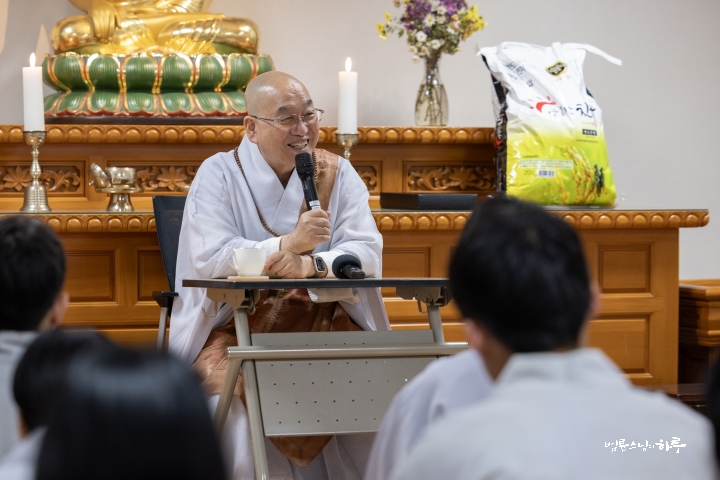
Maintaining a certain level of equanimity means having less stress and fewer personal desires. Most of the suffering we experience comes from our own desires: ‘I need to eat this,’ ‘I need to wear that,’ ‘I need to sleep this way,’ ‘I need to be recognized by others.’ From a practitioner’s perspective, when we become a little freer from desires, we can use the remaining energy to help others. This is the spirit of reducing our food intake to help the hungry and saving on clothing to help those in need. While most people have the perspective of ‘I’m struggling, so please help me,’ if we can control our desires, we’ll have fewer occasions to ask others for help and instead have the capacity to help others. That’s why we engage in volunteer work. Even if we can’t always do this, we gather together to try to live by these principles.
That’s why there’s no need to worry about whether others recognize our work or not. We publicize our activities only because when people learn about this work and are moved by it, it helps make the world a more beautiful place. The purpose is not to raise money through good publicity. That’s why JTS never said from the beginning, ‘We’re doing good work, so please donate money.’ Even when we first built schools in India, we guided pilgrimages to sacred sites and used the profits to build schools. When we started Jungto Society, we didn’t advertise saying, ‘Please donate because we’re starting a new Buddhist movement.’ Several people, including myself, worked part-time jobs like teaching children at academies to earn money to pay for office rent. As more people gradually participated and donations increased, we no longer needed to earn money from outside work. I am very grateful for even this much.
For this reason, JTS funds can be used for money needed to help others, but spending money to satisfy personal desires is not permitted. This is JTS’s financial standard. Because of this perspective, we have not done paid advertising to promote our projects until now.
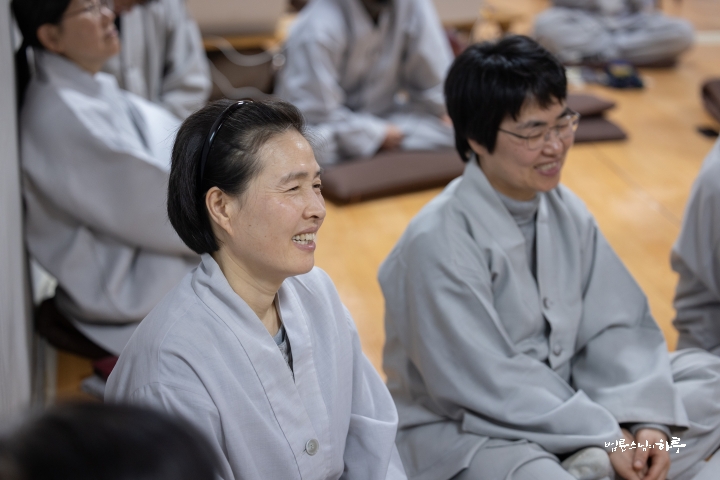
While maintaining these principles, a recent issue was raised. Some suggested that sharing good work with the world could inspire people and help spread the activities more widely. This led to organizing the JTS 32nd Anniversary Photo Exhibition this year. The purpose of publicizing JTS’s work is to inspire people, enable other organizations to benchmark our practices, and expand activities through increased donations and volunteer participation—not to raise money.
General charity organizations need fundraising to be very important because they require funds for staff salaries and office operations. Their projects can only be sustained through successful fundraising. From the beginning, Jungto Society has not used public donations for operational expenses. Even when Dharma Teachers led groups to India for pilgrimage tours, they worked part-time jobs to pay for their own airfare. However, this is no longer necessary. It’s important to understand that this is how JTS projects began and have grown.
Additionally, since JTS is a charity organization based on Jungto Society, many Jungto Society members participate as volunteers. While there are external donations, contributions from Jungto Society members constitute a significant portion. As Jungto Society expands, JTS fundraising naturally increases as well. Moreover, we have a culture of being very frugal and economical. As a result, we rarely face situations where projects cannot be carried out due to lack of funds. Therefore, we don’t need to actively solicit donations through advertising. This doesn’t mean money isn’t needed, but rather that we don’t need to focus too heavily on fundraising in our publicity efforts.
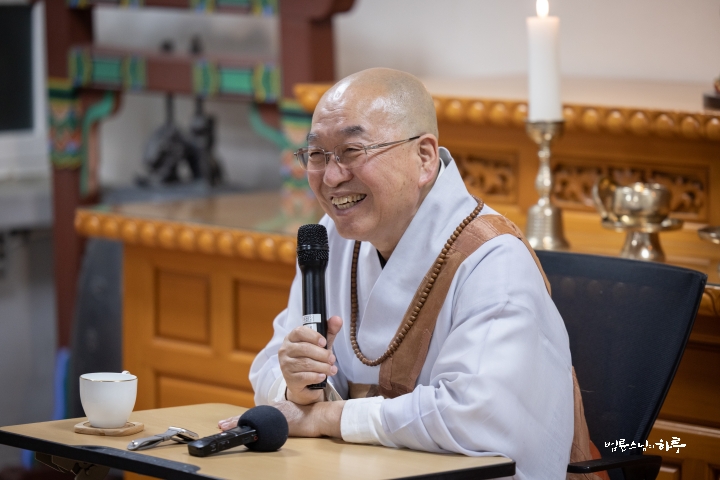
So we can spread the word widely with the hope that many people will learn about our good work. Don’t make fundraising the goal. People who are moved by JTS’s activities will naturally participate in donations. In other words, there’s no need to worry about ‘promotional advertising’ aimed at inducing people to donate.”
“Then wouldn’t it be okay to advertise in a way that changes people’s thinking, like public service announcements? Public service announcements deliver messages like ‘Don’t litter!'”
“While public service announcements are primarily image-based advertising, JTS’s promotion has a slightly different nature and purpose. Images alone cannot sufficiently convey the content of JTS’s projects. For example, when JTS built a school in earthquake-damaged Syria last year, Sunim’s multiple visits to the site and participation in the completion ceremony were continuously featured in ‘A Day in the Life of Sunim.’ About 15,000 to 30,000 people read ‘A Day in the Life of Sunim’ daily, and many of them participated in donations after reading it. In fact, the amount raised later exceeded the amount initially invested in the project. When the content about the Mindanao school completion ceremony in the Philippines was introduced, a large amount was also voluntarily raised. So it’s not that we don’t promote at all, but rather we choose a method where sharing our activities naturally leads to donations through people being moved. Recently, when the 100-Day Dharma Talk was held at the Jungto Social and Cultural Center, people who were moved voluntarily made offerings, and Jungto Society sends most of those offerings to JTS. This is because they contain the congregation’s wish to help neighbors in need. Therefore, there’s no need for advertising that focuses too much on fundraising.
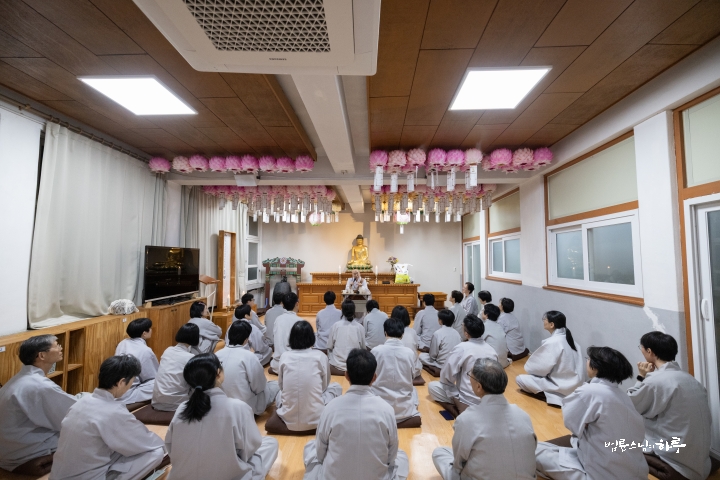
If we were to advertise, we would need to take a different approach from regular advertising. We could use indirect promotion methods like ‘There are still hungry people around the world. Let’s pay attention to them,’ or ‘When JTS carried out this project, this is how the children changed.’ While we don’t directly ask for donations, people who are moved will naturally participate. Sharing our actual activities is much more effective than advertising for fundraising.
From the perspective of Buddha’s teachings, saying ‘I’m in difficulty, please help me’ is not the attitude of a practitioner. On the other hand, it’s acceptable to say ‘This person is in difficulty, let’s help together.’ There’s also nothing wrong with informing people ‘This is what we’re doing’ and having those who are moved by it volunteer to help on their own. I often joke that ‘Dharma Q&A is not free but a deferred payment system.’ While most religions operate on a prepayment basis, we can say that we pursue a deferred payment system where people who are moved make offerings later – in other words, we aim for giving without expecting anything in return.
As JTS’s scope of activities has expanded, there are increasing opinions that we need promotion not to raise money but to inform people about our work. So please create promotional materials well from the perspective of informing people about JTS’s activities and from the perspective of non-capitalist promotional methods.”
“Thank you. I understand well.”
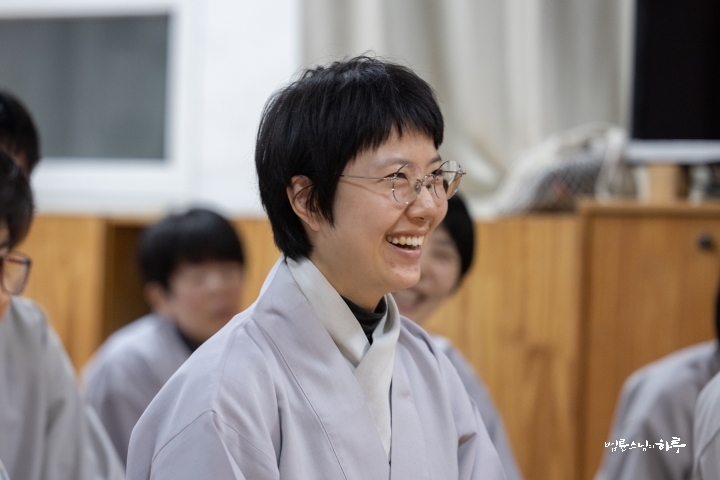
Questions continued to follow.
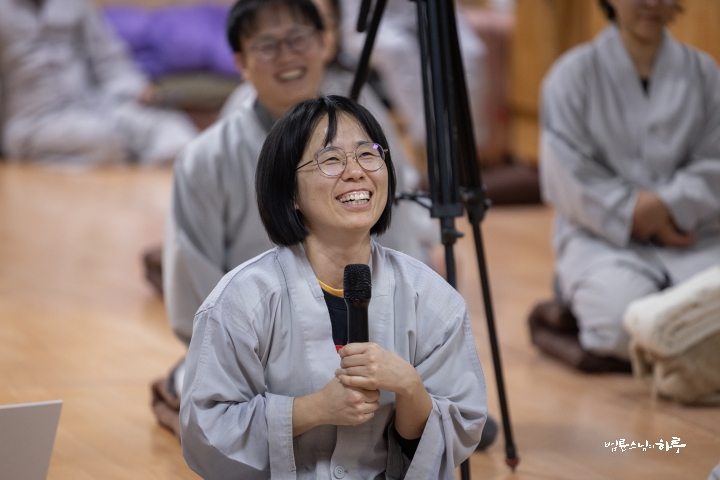
I’m a Chinese Korean, and my health insurance premium is so high that it’s a big burden. I’m wondering if I can receive support from Jungto Society.
I just returned from emergency relief activities in Jamaica the day before yesterday. I’m curious whether JTS plans to expand into Central and South America and to what extent we plan to provide support.
I’m very moody by nature, and I have too many thoughts even when meditating. What kind of practice should I do to better control my emotions in daily life?
When Sunim goes abroad for lectures, can’t I go along as a videographer? I also have a desire to go abroad, but it’s frustrating to only hear ‘no.’
The last questioner asked Sunim for help, saying they were experiencing great difficulty due to a habit that had been troubling them.
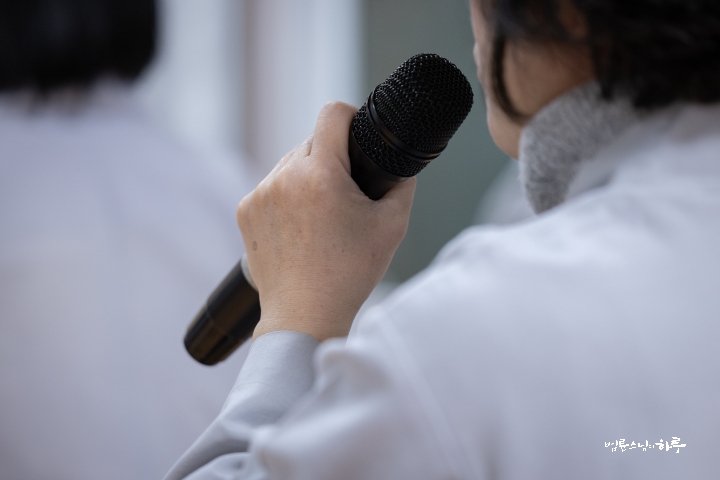
How Can I Break the Habit of Clenching My Teeth and Being Tense?
“The reason your jaw tenses even during meditation is because of your ‘striving mind’ trying to meditate well. The more you try to meditate well, the more you reinforce that state of tension. That’s why when meditating, you must always relax your body and mind and release tension. I saw in the news recently that they hold a ‘spacing out competition’ at the Han River. While it’s far from practice, spacing out can help release tension. Being spaced out is not desirable from a practice perspective because there’s no awareness, but it does have the effect of relieving tension.
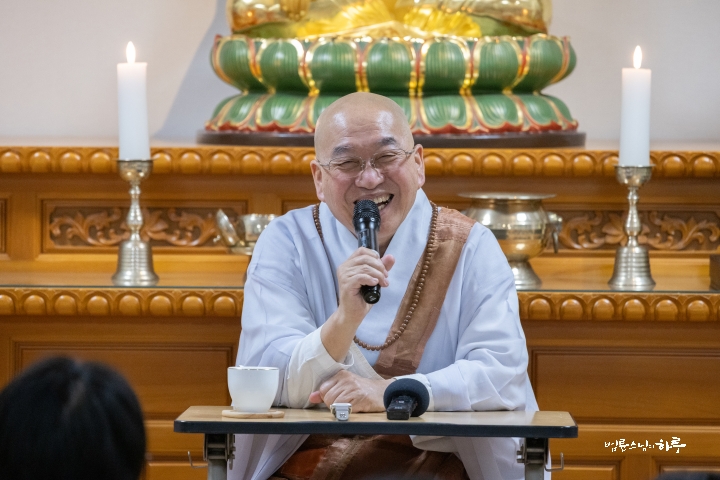
When meditating, don’t force yourself to be aware, but focus more on not being tense. Please practice in daily life while repeating like words to remember: ‘Whatever I do, I do it comfortably without tension.’
If your symptoms are severe, getting medication prescribed by a psychiatrist is also an option. Consult with a professional about whether there are ways to relieve severe tension, and consider taking a very small amount of tranquilizers. Since tranquilizers primarily work to relieve hypersensitive states, they may make you drowsy. There are also vegetables that have similar effects to tranquilizers, so finding and consuming foods that relieve tension could also help.

In summary, first, mentally practice intentionally releasing tension whenever you notice it, and second, physically try using medication or foods that help relieve tension. By combining these two efforts, you will gradually improve.
Most modern people experience a lot of tension. The key issue is ‘the desire to look good.’ Being conscious of others causes unconscious tension. While you may feel fine when sitting still, tension arises in situations where you need to present. Similarly, tension occurs the moment you receive others’ attention. In such cases, rather than avoiding these situations, you should practice repeatedly. Instead of avoiding presentations because you tremble when speaking in front of others, actively step forward and practice speaking. When you repeat the same action, the brain automates and habituates it. Just as you feel extremely tense when first touching a snake but become comfortable with repeated contact, voluntarily practicing in tense situations will gradually make you more natural. Forcing yourself to grit your teeth and endure actually creates more tension, but when you choose to practice voluntarily, tension decreases.”
“I’m currently taking prescribed tranquilizers, but they make me drowsy, so people around me tease me calling me ‘half-asleep.’ I’m wondering if I should stop taking the medication.”
“It depends on the severity of your condition. If the tension doesn’t significantly interfere with daily life, staying awake should be the priority. However, if the tension is severe enough to break your teeth or cause teeth grinding during sleep, then treatment takes priority even if it means being drowsy during the day.
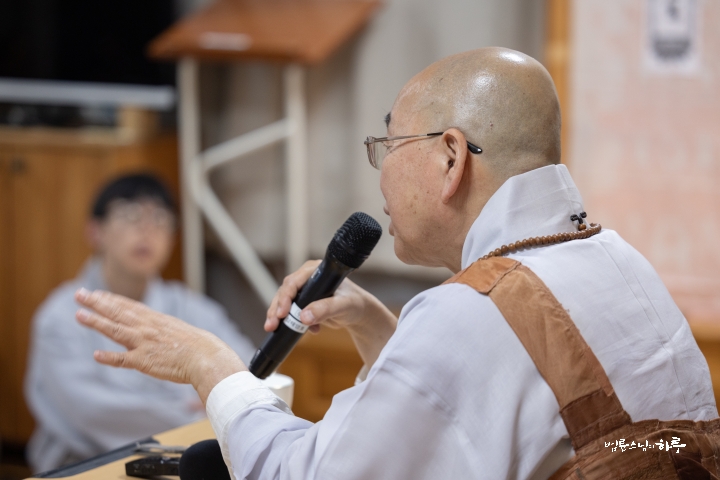
That’s why when you’re prescribed medication for depression or anxiety disorders, it’s good to inform the community members you live with in advance. If you explain that you’re taking medication and may feel drowsy during the day, fellow practitioners will understand if you need to rest in your room briefly during meetings because you’re too sleepy. While using medication as an excuse for laziness is problematic, taking a 30-minute rest to alleviate symptoms is perfectly understandable.
There are also conditions like narcolepsy where people fall asleep uncontrollably during the day. This is different from simply lacking sleep. In such cases, treatment is necessary, and it’s important to inform those around you about your condition so they can help support you.

The work you do is not objectively excessive. The reason even light work feels difficult is because you can’t adjust your life rhythm to match your physical condition. If you lived alone, you could rest when tired and work late when feeling well. However, in community life, you must wake up at 4 AM even when sick and work during the day even when drowsy. You can’t adjust according to your individual condition and must adapt your body to the given conditions. While you may usually be fine, illness can develop when events or communal work coincide with days when you’re not feeling well. Community life has its advantages but also disadvantages. Yet if everyone did as they pleased, order would collapse. That’s why when the whole community gathers, individuals should honestly share their conditions. Get a doctor’s diagnosis and prescription, ask for the community’s understanding for a while, and continue living. Once recovered, return to normal community life. If you feel very tense, practice lightening your mind. If your body is truly struggling, it’s better to speak honestly and take rest.”
“Thank you. I understand well.”
After finishing the conversation, Sunim gave some words of advice to the community members about how they should approach the upcoming ten-day family week scheduled for the end of December.
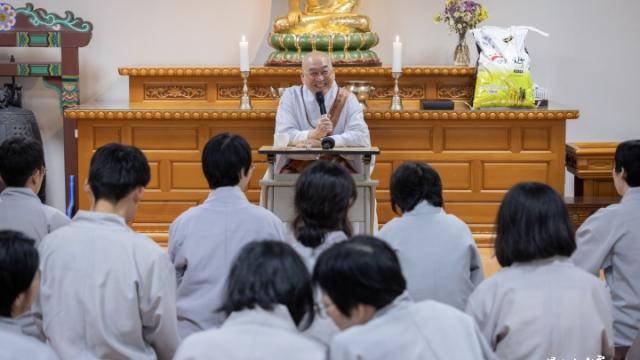
“Jungto Society has the principle of ‘Three Nothings’ (三無). The Three Nothings principle means no holidays, no vacations, and no salary. ‘No holidays’ means there are no designated days off like Saturdays and Sundays. ‘No vacations’ means there are no set vacation days throughout the year. ‘No salary’ means we do not pay wages based on the concept of labor costs. This is because our daily life itself is practice.
The Principles of Jungto Society Activities and the Meaning of Family Week
Jungto Society has maintained these principles from its founding to the present day. In the early days, there were no issues. At that time, most Jungto Society volunteers were people who had already left home and dedicated themselves to various fields while engaging in social movements during their college years. In some ways, they could be said to have had an even stronger commitment to renunciation than monks. Since such people gathered and worked together, even though there were some differences of opinion about not getting married or not having private property, ‘leaving home’ itself was never an issue. This was because everyone had already thrown themselves into living for the world.
Therefore, all volunteers were able to live without holidays or vacations. However, as time passed and parents grew older, opinions were raised that it would be nice to briefly visit home during traditional holidays. The fact that we can practice and engage in activities like this is also due to the grace of our parents. Rather than completely severing family relationships, brief visits during holidays were permitted with the intention of remembering this grace through some communication. Then one day became two days, and eventually, in line with social atmosphere, it settled into visiting home for about three days.
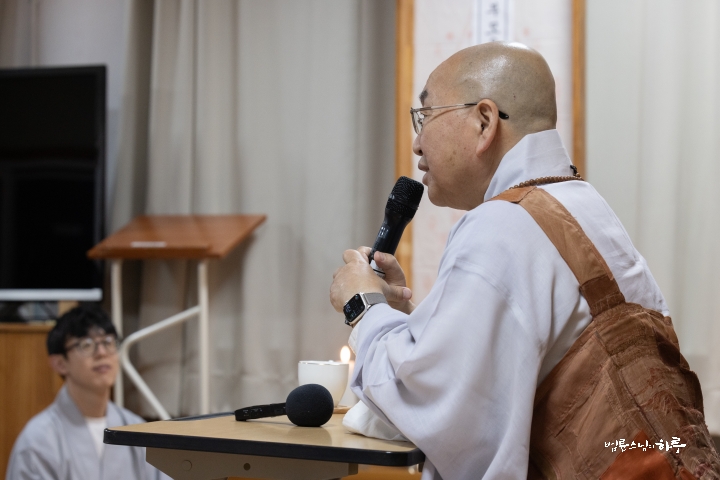
There were also opinions that it is difficult to have learning opportunities due to the lack of vacation time. Although meditation retreats are held within Jungto Society, it is difficult to secure time to participate in 10-day intensive courses. There were also requests for time to visit other organizations to expand experiences or to care for elderly parents. Just as meditation halls have a period of release after three months of intensive practice, Jungto Society has decided to have a ‘family week’ of about ten days once every three years. This is why it is called ‘family week’ or ‘personal maintenance period’ instead of vacation.
Therefore, using this period to make travel plans and go sightseeing is not appropriate for a practitioner. If monks who have left home spend their release period traveling and living like secular people, how would people view them? The dignity of a practitioner must be maintained wherever one is.
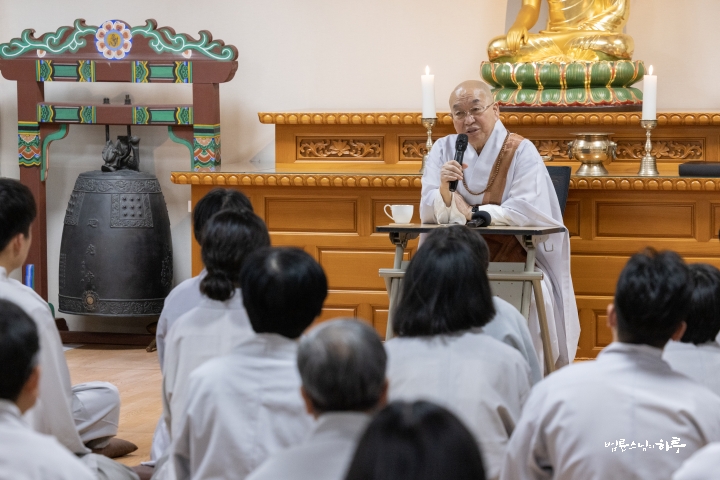
So one should spend the family week with the mindset of ‘I am a monastic practitioner, but since my parents are elderly, I will go serve them during this period.’ Dharma Teachers also rarely use this time, and most spend it conducting educational programs that have been postponed or handling backlogged work. If one’s parents have already passed away or there is no suitable place to go, one can say ‘I will stay and maintain the temple grounds.’ The thought that ‘it’s vacation so I can play around freely and come back’ greatly contradicts the original spirit of leaving home. Family week is not a vacation but a personal maintenance period for practice and service. Therefore, making travel or sightseeing plans is not appropriate. If one receives criticism that it is not befitting of a practitioner, one should reflect on oneself and revise the plans.”
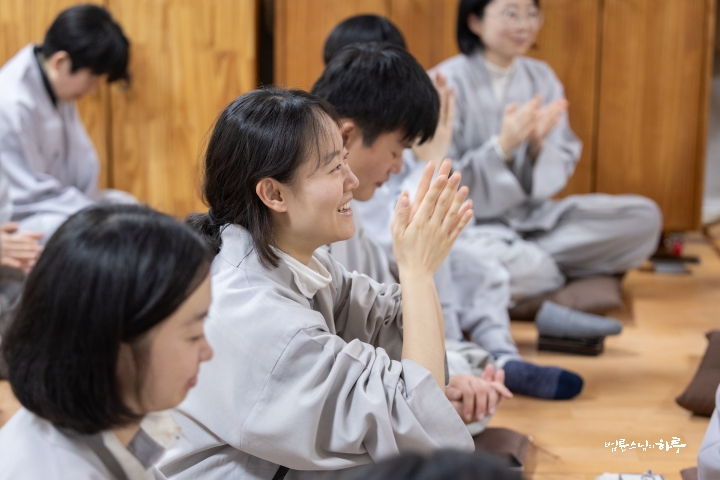
After spending more time taking questions and discussing the principles of Jungto Society activities and the meaning of Family Week that Sunim had emphasized, the dialogue session concluded at 10 PM.
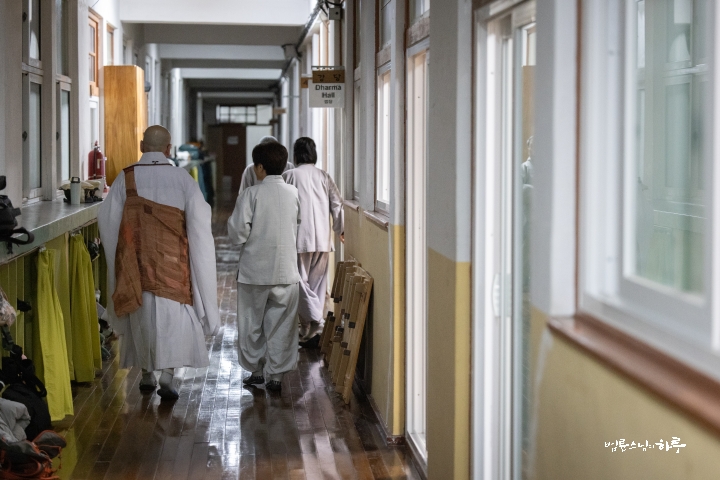
Tomorrow morning, the plan is to load cabbages onto a truck to send to Seoul, participate in communal work picking peppers, and then take an autumn outing to Namsan Mountain in Gyeongju. In the afternoon, everyone will return to their respective residences, and Sunim will travel to Busan to continue with the ninth Dharma Q&A session of the ‘Happy Dialogue’ series.




